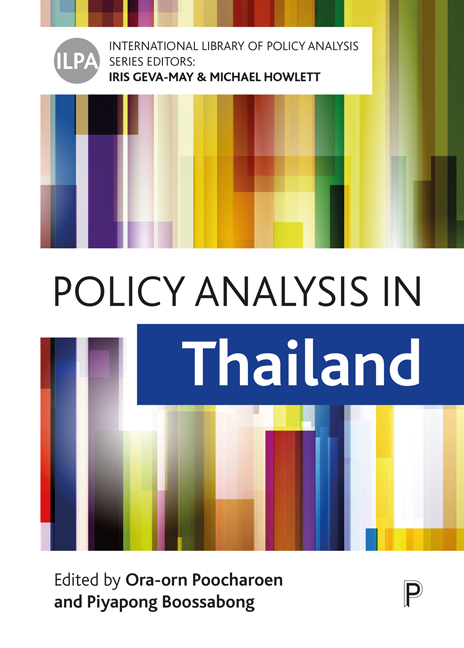Book contents
- Frontmatter
- Contents
- List of figures and tables
- List of abbreviations
- Notes on contributors
- Editors’ introduction to the series
- Introduction
- Part One History, styles and methods of policy analysis in Thailand
- Part Two Policy analysis within executive government
- Part Three Policy analysis beyond executive government
- Part Four Political parties and interest groups in policy analysis
- Part Five Policy analysis education and research
- Index
three - Policy analysis in central government
Published online by Cambridge University Press: 20 January 2024
- Frontmatter
- Contents
- List of figures and tables
- List of abbreviations
- Notes on contributors
- Editors’ introduction to the series
- Introduction
- Part One History, styles and methods of policy analysis in Thailand
- Part Two Policy analysis within executive government
- Part Three Policy analysis beyond executive government
- Part Four Political parties and interest groups in policy analysis
- Part Five Policy analysis education and research
- Index
Summary
Introduction
Developing countries, including Thailand, are believed to hold distinct characteristics regarding policy making and governance of the state which cannot be completely described by explanatory accounts of public policy formulated in more developed countries (Horowitz, 1989; Mooij, 2003). This focus on policy making in developing countries is vital to understanding the nature of policy analysis in the central government. In particular, the policy process in developing countries is seen more realistically through an interactive approach which regards public policy as a result of interactions among different, interrelated actors (Narain, 2018). With this in mind, this chapter argues that to develop an explanatory account of Thai public policy, interactions among actors manifested through the structure of the institutional arrangements in which policies are defined and developed should be key to this explanation.
This chapter aims to examine the nature of Thailand's governance configuration and development in the public policy-making processes of the central government since modernisation, starting from the early 1930s. By discussing governance at the level of policy making, this chapter is focused on the changing role of the state vis-à-vis society and its consequence for policy making. In other words, it is interested in how public policies are created and who puts them on the policy agenda of the central government.
A significant portion of the public policy making in Thailand is executed by the state and its government. The Thai state represents a centralised and ‘activist state’ (Samudavanija, 2009) that plays a leading role in every programme within Thai society. Policy changes are usually driven, if not dominated, by the state and its apparatuses, when compared to non-state entities. Not only does the state shape policy but it also shapes the governance of policy, namely the institutional arrangements which give rise to policy. This is usually done through several broad policy frameworks such as the Constitutions and the National Economic and Social Development Plan (NESDP). Through the central government, the state is conditioning policy changes and is responsible for policy development of the country over time.
- Type
- Chapter
- Information
- Policy Analysis in Thailand , pp. 49 - 66Publisher: Bristol University PressPrint publication year: 2023



